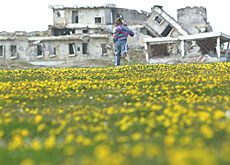
Parliament extends aid package after debate

Parliament has granted a two-year extension to Switzerland's development-aid budget for eastern Europe and Central Asia.
The package, worth SFr400 million ($321 million), will allow Switzerland to keep supporting former Soviet-bloc nations’ transition towards democracy.
The House of Representatives voted on Monday in favour of extending the present line of credit, which would have run out at the end of the year.
Paolo Janke, secretary of the House’s foreign affairs commission, said the credit line was an important part of Switzerland’s development aid strategy.
“Cooperation with the countries of eastern Europe is one of the pillars of Swiss foreign policy,” he told swissinfo.
After the fall of the Berlin Wall, Switzerland immediately lent its support to former communist countries, helping them to make the transition to democracy and a free-market economy.
Aid was initially concentrated on the countries of central Europe and the Baltic States.
But in the mid-1990s attention shifted to the regions in which the reform process was moving less rapidly: southeastern Europe and the Commonwealth of Independent States (CIS).
Credit line
Since 1990, parliament has authorised three framework credits and two complementary lines of credit worth a total of SFr3.05 billion.
The funds are distributed by the Swiss Agency for Development and Cooperation (SDC) and the State Secretariat for Economic Affairs (Seco).
According to Janke, Switzerland’s commitment is not only an expression of solidarity in supporting the reform process in eastern Europe, it also serves to promote the country’s own interests.
“Switzerland’s image in eastern Europe is strengthened, and it consolidates our position vis-à-vis the European Union (EU) where integration is concerned,” added Janke.
The present credit line – granted in 1999 and worth SFr1.44 billion – runs out at the end of 2004.
Cohesion
The cabinet set the new development-aid budget for the countries in question at SFr800 million for the next four years.
But developments in Swiss-EU relations meant that the new package was put on hold, and parliament was instead advised to extend the existing budget for two years, with a credit of SFr400 million, until matters between Bern and Brussels become clearer.
“It is a kind of provisional solution,” said Janke.
The complicating factor is Switzerland’s SFr1 billion contribution to the EU’s cohesion fund, which is aimed at boosting the economies of less prosperous member states.
Switzerland is obliged to support EU cohesion as part of its obligations agreed in a second set of bilateral treaties, which are due to be signed in October.
But before a new development aid budget can become active, parliament must decide whether it should be part of Switzerland’s contribution to the cohesion fund. Janke says it should.
“During this year, the question has emerged of Switzerland’s contributions to the social and economic cohesion of the EU,” Janke explained.
“These contributions should be funded, at least in part, from the resources set aside for cooperation in eastern Europe.”
Stalling
To give itself time to decide the matter, the Swiss government has told the EU that the funding agreement will not come into force before 2006. (Brussels had wanted a “gesture” from Bern before the ten new members joined the EU on May 1.)
“For the time being, we have not included anything in the 2005 budget,” declared Swiss President Joseph Deiss last month.
According to the Federal Integration Office, no precise agenda for the funding Switzerland will be providing to the EU has yet been drawn up.
“The areas of intervention and the countries that will benefit from our contribution have not yet been decided,” said spokesman Adrian Sollenberger.
“There are financial, legal and administrative aspects of the matter that Switzerland has yet to resolve.”
swissinfo, Luigi Jorio
In 2003, Switzerland devoted 0.38% of its gross domestic product to helping developing countries.
Since 1990, eastern Europe has benefited from credits worth SFr3.05 billion.
The extension of the present line of credit, subject to the agreement of the House of Representatives, would be worth SFr400 million over two years.
Switzerland has been active in the countries of eastern Europe since 1990, and since 1992 in the Community of Independent States.
The three framework credits granted to date have been to support the development of democracy and the transition to a free-market economy, while taking into account social needs and environmental protection.

In compliance with the JTI standards
More: SWI swissinfo.ch certified by the Journalism Trust Initiative




























You can find an overview of ongoing debates with our journalists here . Please join us!
If you want to start a conversation about a topic raised in this article or want to report factual errors, email us at english@swissinfo.ch.